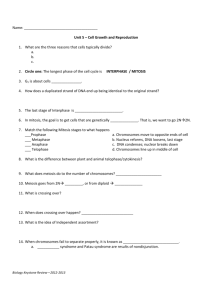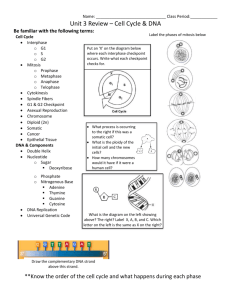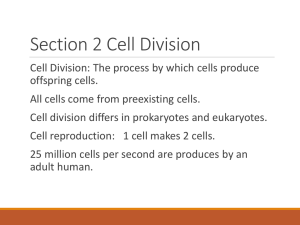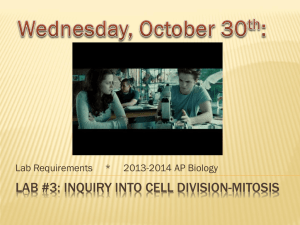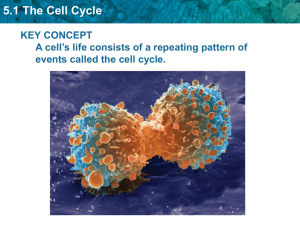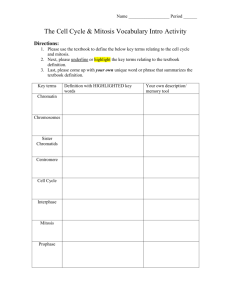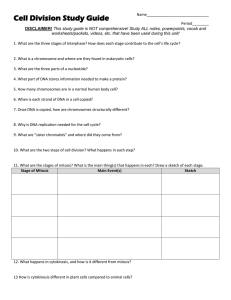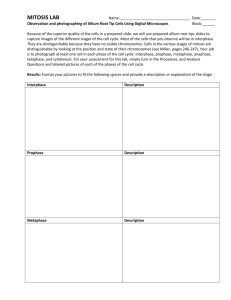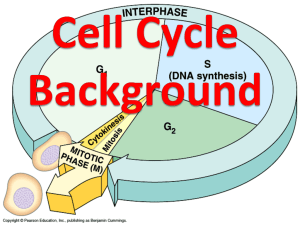Cell Division
advertisement
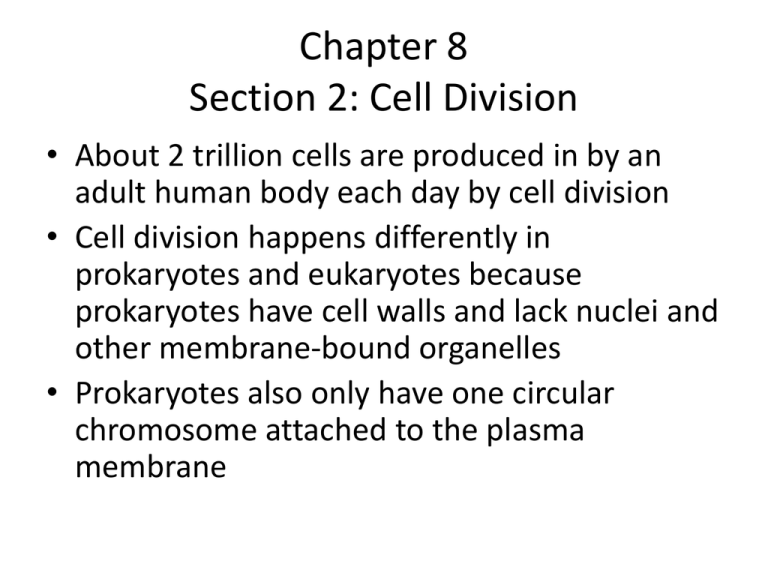
Chapter 8 Section 2: Cell Division • About 2 trillion cells are produced in by an adult human body each day by cell division • Cell division happens differently in prokaryotes and eukaryotes because prokaryotes have cell walls and lack nuclei and other membrane-bound organelles • Prokaryotes also only have one circular chromosome attached to the plasma membrane Cell Division in Prokaryotes • Binary fission is the division of a prokaryotic cell into two offspring cells • DNA is copied, which results in two genetically identical chromosomes • The cell then grows until it reaches twice the size and the cell membrane begins to push inward, constricting the cell in the middle • A new cell wall then forms around the new cell membrane until the two cells split completely into two new cells http://www.youtube.com/watch?v=3cD3U2pgb5w Cell Division in Eukaryotes • In eukaryotes, BOTH the cytoplasm AND the nucleus have to divide • MITOSIS is cell division that results in two new genetically identical cells • This occurs in organisms that are undergoing growth, development, repair or asexual reproduction • MEIOSIS is cell division that results in haploid cells that are genetically different; this creates gametes The Cell Cycle • The cell cycle is just a repeating set of events in the life of a cell • Cell division is only one phase of the cell cycle • The time in between each cell division is called interphase • Interphase is divided into three phases: G1, S and G2 • Cell division is divided into two phases: mitosis and cytokinesis Interphase • Cells spend the majority of their time in interphase • Following cell division, the new cells are about half the size of the original cell, so in G1 phase, the new cells grow • After cells reach their mature size, they have to copy their DNA: this happens in the S phase (for synthesis) • Once the DNA is copied, cells prepare for cell division in the G2 phase MITOSIS • Mitosis happens in 4 stages: – Prophase: DNA tightens into chromosomes – Metaphase: Chromosomes line up in the middle of the cell and fibers attach to centromeres – Anaphase: Chromatids of each chromosome pair separate at the centromere and move to opposite ends of the cell – Telophase: Chromosomes reach each end of the cell, fibers dissemble, and chromosomes loosen to chromatin Control of Cell Division • The cell spends most of its life in Interphase, which has a couple of “check points” • These “check points” allow the cell cycle to stop or go depending on whether the cell passes some “tests” – G1 checkpoint: If the cell is healthy and the right size, proteins at this checkpoint will allow it to go to the S phase – G2 checkpoint: DNA repair enzymes check DNA replication and make sure that there is no damage; proteins will allow it to go to mitosis – Mitosis checkpoint: Proteins will signal the end of mitosis if everything has passed and the cell will enter G1 phase What Happens if Control is Lost? • The proteins that make sure that cells grow and divide properly are coded for in genes • Sometimes cell growth and division is disrupted if the proteins do not work properly • If this happens, it could lead to cancer, which is the uncontrolled growth of cells • Cells could also overproduce growthpromoting molecules, which can also lead to an increase in cell division Cancerous Cells Think About It • What would happen if cytokinesis occurred before mitosis? • What would happen if chromosomes did NOT replicated during interphase? http://www.youtube.com/watch?v=DD3IQknCEdc
